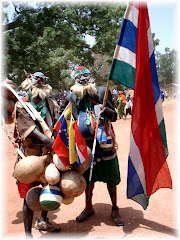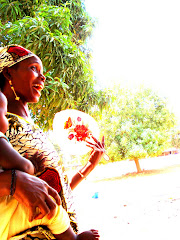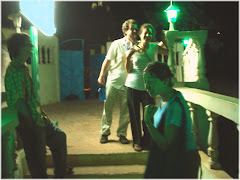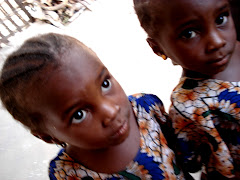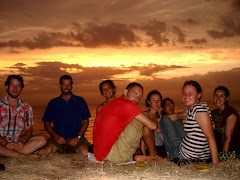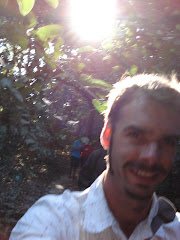 Ndungu artii!! The rains have come!! Finally. You’d think that after nine years in New Mexico I would be used to watching storms on the horizon that never bring rain. I’m not. In fact, I am horrible at it. I have spent the last month with my neck craned to the sky begging each passing cloud to spit a little something. I’ve tried English, Pulaar, and Mandinka but the rains speak an entirely different dialect than anything I’ve yet to learn. Shaking my fist at the heavens and stamping my feet on the ground have also gone unheeded.
Ndungu artii!! The rains have come!! Finally. You’d think that after nine years in New Mexico I would be used to watching storms on the horizon that never bring rain. I’m not. In fact, I am horrible at it. I have spent the last month with my neck craned to the sky begging each passing cloud to spit a little something. I’ve tried English, Pulaar, and Mandinka but the rains speak an entirely different dialect than anything I’ve yet to learn. Shaking my fist at the heavens and stamping my feet on the ground have also gone unheeded. People in Foni Jarrol expect rains to come by June 15 but we did not receive our first appreciable precipitation until fourteen days after that. Other places in The Gambia have received a bit more than we have, but all together this country is unseasonably dry. Now people all around my village are scrambling to clear bush, bust sod, and get crops into the ground. The bulls and donkeys seem perpetually tethered to antiquated plows and seeders.  No man goes anywhere without his machete because we all are helping one another cut back the bush that has advanced since last year. Fallowed land with fifteen foot tall trees and ten years of growth is being brought into cultivation to try to maximize our food growing capacity.
No man goes anywhere without his machete because we all are helping one another cut back the bush that has advanced since last year. Fallowed land with fifteen foot tall trees and ten years of growth is being brought into cultivation to try to maximize our food growing capacity.
I am working primarily with Landing Manneh, my host brother, to prepare a fallowed plot for groundnut cultivation. He is a little older than I am and is married to a wonderfully patient woman named Fatou. They have three children named Musu, Bauweea, and ModuLaamin. They have been living in Kombo for the past several years where Landing worked as a security officer at an embassy but they recently moved back to the village to try to reacquaint themselves with rural life. Landing told me that living in Kombo is too expensive and too crowded and that he wanted to be back home to be with his ailing father Baa Cheike- also known as Tourre Fula which is Mandinka for Two Bulls. Tourre Fula is a renowned farmer and stories are told about his abilities to grow millet in desiccated soil and groundnuts without rain.
The Mannehs share the millet field behind our compound with the Sannehs and so Landing, Junkong, and I have been plowing and sowing since the first decent rain. The process begins with hooking the donkey to the plow. I have American ideals about the treatment of animals but it is very difficult to make a donkey do anything without screaming at him continuously and striking him with sticks across the ear and the ass. When I first began, I thought that I could catch more flies with honey than vinegar, could dangle a carrot in front of the donkey and whisper sweet words into his ear, could get more accomplished being nice than being mean. I was wrong. Donkeys are asses. Two men are required for plowing, one to whip the donkey and the other to press the tines of the plow as deeply into the windswept and sun-scorched earth as his chest muscles will allow. Truth be told, I’m not very good at either of these tasks. My voice is too small when I scream at the donkey and I hold back with the whip. Physically, I am the exact opposite of my Gambian counterparts. My host mother is strong enough to knock me to the ground and she is in her fifties. I push with all of my might to get the plow to actually make a decent furrow and wind up with sore muscles from my neck to my buttocks and hardly a scratch in the surface of the earth.
Thus, I have been relegated to clearing the groundnut field. It is not easy. We want to do about one hectare of groundnuts which is 100x100 meters. The field that we are using is about a ten minute walk west of the village and has been fallow for a number of years. I try to get out there early before the sun is too hot. Every morning after watering the tree nursery behind my house and my vegetable beds in the women’s garden I try to hone an edge onto my machete. Bakke am goes everywhere with me. My machete is my most useful tool. I use it for digging fence-post holes, dismantling termite mounds, and chopping trees with trunks five inches in diameter. Gambians know how to keep their machetes sharp by rubbing the blades against rocks and I’ve been trying to learn the skill but I am never satisfied that it is sharp enough. It takes a while to get to the field because I have to greet so many farmers along the way already out in their fields.
I am not entirely pleased having to participate in slash and burn agriculture, however food self-sufficiency is becoming increasingly a priority. The trees and brush that I drop are unpalatable to animals and useless to man except as fence posts and firewood. I do not participate in clear-cutting and I try to convince others that we should leave certain trees stand in and around our fields. So far, Landing has allowed me to leave some trees and I am hoping that other farmers will try to follow our example. Already, Gambians leave palms, baobabs, bush mangoes, and large winter thorns to stand in their fields. I am also leaving the camel-foot tree, so called because of the shape of its leaves, due to the fact that it fixes nitrogen in the soil surrounding its roots and provides animal fodder in the dry season thereby increasing manure under its canopy.
I thought I would be able to finish the clearing yesterday but unfortunately I slipped in the mud the day before and sprained my back as I fell. I did not realize how badly I was hurt until I got to the field yesterday morning and started bushwhacking. Obviously, this is extremely physical work involving a constant stoop as you grasp the brush with one hand and hack away with your machete in the other. After fifteen minutes of this I was experiencing intense pain emanating from my lower lumbar reaching into my legs and shoulders. Soon I could hardly lift my feet and was sweating profusely. I became slightly lightheaded and saw bright spots and strange contrasts everywhere I looked. I began to wonder if I had been bitten by some strange spider and was going into shock. I needed a stick to walk and it took me thirty minutes to get home where I instantly crashed onto my bed and stayed all day. I phoned the PC nurse in Kombo who told me to come into the office. The cramped and bumpy ride in the gelegele was not amusing but somehow I made it here where she checked me over, gave me an ice pack and some ibuprophen, and told me that I cannot work for at least ten days. Great timing.
I met some children near the border with Senegal who were collecting scrap metal to sell. They make one dalasis (about five American pennies) per kilo of rusted carparts and foodbowls which is then transported to Kombo where it is made into things like hammerheads. I went on a camping trip in
I took another bike ride a few days later to Jeff’s site which is about seventy kilometers from where I live. A few months ago while returning to site from IST, the gelegele that Jeff was riding in crashed and flipped over in Bondali. He was asleep and woke while it was skidding end over end as women and chickens fell all round him. His shoulder and arm were injured and he was taken first to Bwiam hospital, then to
The bike ride tried to kill me. This was the third time I’d ridden out to Jeff’s and by far the worst. The heat and humidity right now in The Gambia are unbearable. Oppressive actually. I know I’ve said it before but this is really ridiculous. I got a late start too and didn’t leave my house until
Later that night- after drinking gallons of water and chewing rehydration tablets like breathmints- the three of us suited-up to do some honey-harvesting. One of the old men that Nick and I met on our beekeeping trek there last month had several hives that he hadn’t looked at for a year and wanted us to take a look inside them. We shouldn’t have agreed but we do so love the thrill of beekeeping. By dark we were wrapping one another with duck tape and heading into the bush. Every beekeeper knows that the less you handle hives, the wilder the bees will become. A year is nine months too long and so all five hives we opened were honey-bound and pissed-off. We were covered with bees and each of us got stung more than twenty times as they chewed through our suits. The air was heavy with sweet alarm pheromone, the honey was more than we could carry, and the old man hiding a short distance away warned us that there were most likely pu ff adders lurking in the night.
ff adders lurking in the night.
The next day we worked in the fields helping the Manjangs plant rice in their small plot in northern Kiang. The boys hooked-up the donkey to the planter while Adreesi modified the seed-spinner insert for the rice grains. Men and boys utilize animals and machines while the women, who were also planting rice, use a carved stick with a blacksmith forged metal hoe on the end. I took a turn at each and can attest that neither is very easy. But the boys take turns screaming at the donkey while the women gossip and sing songs; the latter is definitely more idyllic.
I was already beginning to fret about tomorrow’s bike ride. I was hardly recovered from getting here and now I had to get back home. That night, after more beekeeping, I slept in Jeff’s hammock in his backyard. Some donkey conversation woke me at four in the morning and so I decided that the moon was full enough to just get going. Moonlight isn’t nearly as hot as sunlight and the wind was calm. I pedaled hard and made it home in less than three hours which was quite an improvement on my previous time.
Another trip I took was an excursion to
It’s not easy. The classes include students representing a range of grades and comprehension levels so some of the students were unable to answer even a single question while others were better prepared. In The Gambia, education is developing but right now I think that in many ways the system is failing the students. Rote memorization is valued over critical thinking. Trying to get students to consider abstract concepts that Americans are familiar with (recycling, global warming, biodiversity) is often asking too much. The highest score in the classes I taught was 42 out of 80 even though we had an extensive review and most of the questions were multiple choice. For example, “What are fodder trees? Trees used to stop wind; trees that animals can eat the leaves of; our male parent in the forest; trees popular for bird watching.” The majority of students selected “Our male parent in the forest."
Then came the practical side of the exam. The forester that we worked with on the class thought it would be a good idea to have students bring trash to the school since one of our lessons was “clean environment.” He told them to bring fifteen plastic bags, twenty five batteries, and five ruined sandals. I agree that The Gambia needs to work on trash clean up. I hate when I am digging in my garden and find a leaky d-cell buried there. I don’t like cleaning up other people’s plastic sacks that blow across the compound into my yard. Still, what was supposed to happen once the students brought the trash to school? There is no rural trash service whatsoever. Set settal, which occurs on the last Saturday of every month, is a mandatory trash clean-up across the nation. Mostly people ignore it but some at least rake the plastic bags, batteries, donkey dung, and discarded clothes into a huge pile and set it on fire.
As I collected the exam papers, I was assaulted by thirty students at one school and thirty five at the other, each with a ridiculous load of tattered sacks, disintegrating batteries, and stinky sandals. I am lucky that some of the students didn’t care enough to bother. Now I have to find some way to dispose of 983 used batteries, 195 broken flip flops, and 637 tattered plastic bags.
Last week the day finally arrived for the excursion. I awoke at
But why couldn’t it wait until tomorrow to rain? I had told the children to be waiting at the schools by  m somehow. We were on our way and the rain had lessened.
m somehow. We were on our way and the rain had lessened.
We arrived at Kanali and the rain had transformed to the light drizzle that characterizes everyday of ndu ndungu. The park is a sprawling, forested area with a high fence surrounding it; the closest thing to a safari that The Gambia has ever known. More a zoo than a safari since most animals are inside individual enclosures. Once, there were hippos and lions but now there are only some crocodiles, zebras, camels, hyenas, and ostriches. The children were excited to see these creatures; many of them had only seen camels and zebras in books. We also visited their farm where they grow many of the traditional Gambian cereals including sorghum, millet, and findi. They have an impressive citrus orchard and oil-palm plantation.
Then we went to
Yesterday was the Fourth of July in The Gambia. Probably there too. Many Volunteers came into town and we spent the afternoon at Rodney’s house. He is the Peace Corps country director for the environment sector and an all around great guy. We barbequed bush pig, listened to Alice's Restaurant on satellite radio, and caught-up with one another. It was a potluck with all sorts of great food so most of us ate like we haven’t eaten since Thanksgiving.
And that’s about it for this month. My back is getting better and I hope to return to site tomorrow. There is a lot of work to do and I feel like I am missing my big chance to get more seeds into the ground. On a sad note, my Solio solar charger has stopped working leaving me with an uncharged ipod. This event has drastically altered my Peace Corps experience. I don’t know what to do without hearing music everyday. I am trying to be miserly about what I listen to and when I do it. Instead of randomly playing a shuffle for hours at night or listening while I'm off for a run, I am picking my tunes carefully. Whatever song I choose to listen to last will get stuck in my head for days. The soundtrack to The Gambia or at least the backbeat to the rhythms of donkeys braying and babies crying and stars falling and clouds forming. I will try to send the Solio back to the company for repair. Until then, every time you get into your car and sing along to your favorite song, remember me here trying to get by with nothing but a shortwave radio broadcast of a Portuguese weather report. Maybe they are calling for rain.

















